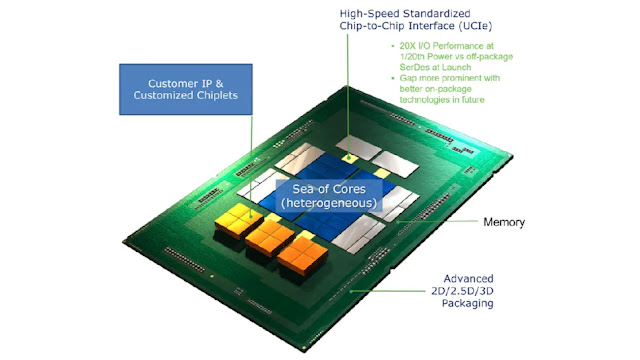HIGHLIGHTS
- UCIe will increase chiplet interoperability throughout the industry.
- A UCIe 1.0 standard has already been approved by the consortium.
- UCIe has the support of major chip foundry owners and cloud service providers.
Chipmakers and cloud service providers have collaborated to develop a new Universal Chiplet Interconnect Express (UCIe) standard that would improve chiplet interoperability. The programme is sponsored by industry giants such as TSMC, Intel, Qualcomm, Arm, AMD, Microsoft, Meta, and Google and is designed to allow manufacturers to employ alternative 'chiplet' components when manufacturing SoCs. Because of the universal design, the UCIe standard will allow firms to design and create CPUs and SoCs more quickly, as well as allow for numerous combinations of components.
The new UCIe collaboration, according to Tom's Hardware, will assist standardise die-to-die connections between chiplets, which are blocks of linked circuits present in current processors. The new standard, which will be accessible on x86 and Arm architectures, has the potential to reduce the cost of SoCs and CPUs while also shortening their development time.
Chiplets had previously lacked an open-source design, making it impossible for a manufacturer to make them work with other chiplets. All processors, memory, and I/O will have standardised connections as a result of UCIe, allowing them to coexist with other components. The new standard may provide manufacturers with the same convenience as PCIe (peripheral component interconnect express), which connects storage, memory, and graphics components.
The new UCIe specification might lead to manufacturers in the future being able to "shop" for chiplets from multiple vendors while developing their own CPUs and SoCs. When compared to integrated monolithic circuits, which incorporate all of the components on a single piece of silicon, this might conceivably shorten the development process and the time it takes to bring a product to market.
For the time being, the consortium has approved a new UCIe 1.0 definition that will focus on validation and functionality in order to speed the process of standardising chiplet interoperability. However, it may be some time before customers see new processors based on the new UCIe standard, which might be used in smartphones, desktop computers, and powerful server CPUs.
According to the consortium's website, the collaboration includes industry giants such as semiconductor foundry owners such as Samsung, TSMC, and Intel, as well as firms such as Qualcomm, Arm, and AMD, as well as cloud service providers such as Microsoft, Google, and Meta.


